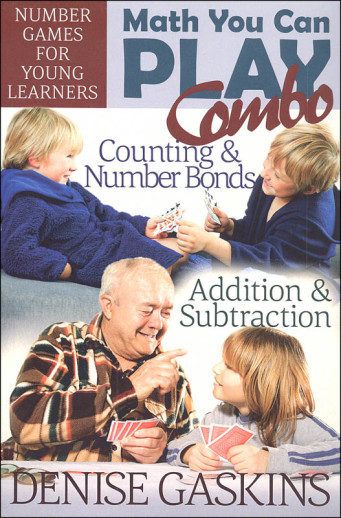We use cookies to make your experience better. To comply with the new e-Privacy directive, we need to ask for your consent to set the cookies. Learn more.
Math You Can Play Combo: Number Games for Young Learners
Sometimes rote memorization and workbooks aren't enough to help a child remember numbers and math concepts; a game is sometimes the key to retention. Denise Gaskins is a veteran homeschool mom who wrote Math You Can Play, featuring 42 games to help children grasp important math concepts. Using items like playing cards, dominoes, dice, poker chips, and even a cribbage board, these games help your young children learn and practice math skills like recognition, place value, number sense, and basic addition School-age children develop skills of basic math to the hundreds and beyond. Logic games help build thinking skills. The book begins with learning strategies and includes resources and references to expand on the information in the book. So, what are you waiting for? Clear off a table, grab a deck of cards, and let's play some math! 210 pgs.
Math You Can Play Combo features two books in one, with 42 kid-tested games that offer a variety of challenges for preschool and school-age learners. Young children can play with counting and number recognition, explore place value, build number sense, and begin learning the basics of addition. School-age kids can develop mental flexibility by playing with numbers, from basic math facts to the hundreds and beyond. Logic games build strategic thinking skills, and dice games give students hands-on experience with probability.
Math games pump up mental muscle, reduce the fear of failure, and generate a positive attitude toward mathematics. Through playful interaction, games strengthen a childs intuitive understanding of numbers and build problem-solving strategies. Mastering a math game can be hard work, but kids do it willingly because it is fun.
If you are a parent, these games provide opportunities to enjoy quality time with your children. If you are a classroom teacher, use the games as warm-ups and learning center activities or for a relaxing review day at the end of a term. If you are a tutor or homeschooler, make games a regular feature in your lesson plans to build your students mental math skills.
So what are you waiting for? Clear off a table, grab a deck of cards, and let's play some math!
Sometimes rote memorization and workbooks aren't enough to help a child remember numbers and math concepts; a game is sometimes the key to practicing and remembering math concepts. Denise Gaskins is a veteran homeschool mom who developed the series Math You Can Play. The books are full of games that can be played by your family to help children grasp the important concepts needed to be successful in math. Using items like playing cards, dominoes, dice, poker chips, and even a cribbage board, these games help your children learn and practice their math. Each book in this series begins with the learning strategies and includes resources & references to expand on the information in the book.
| Product Format: | Paperback |
|---|---|
| Brand: | TableTop Academy Press |
| Author: | Gaskins |
| Grades: | PK-AD |
| ISBN: | 9781892083210 |
| Length in Inches: | 9 |
| Width in Inches: | 6 |
| Height in Inches: | 0.5 |
| Weight in Pounds: | 0.75 |

